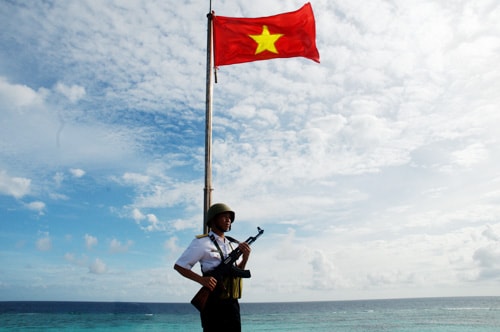National sovereignty and national sovereignty at sea
(Baonghean.vn) -Question 21. What are national sovereignty and national sovereignty at sea?
Reply:The legal status of maritime zones and continental shelves has been specifically, strictly and clearly regulated by the Law of the Sea, with very different contents. To understand the basic rights of coastal states in their maritime zones and continental shelves, we first need to learn about national sovereignty.
National sovereignty includes two contents: the supreme right of a nation within its territory and the independence of a nation in international relations.
 |
| Illustration photo |
Within its territory, a nation has supreme legislative, executive and judicial powers. All political, economic, cultural and social issues of a nation must be decided by that nation; other nations and international organizations have no right to interfere. All organizations and individuals residing in that nation's territory must comply with the nation's laws unless otherwise provided for by international treaties to which the nation is a signatory.
In international relations, national independence is expressed in:
- Self-determination of all domestic and foreign affairs, other countries have no right to interfere or impose; no force or agency stands above the nation, has the right to set laws and force the nation to comply.
- A State is only obliged to comply with the basic principles of modern international law, the provisions of international treaties that it has signed or participated in, and at the same time respect international practices as well as international treaties signed by other States in accordance with the basic principles of modern international law.
National sovereignty at sea also includes the above basic contents.
The coastal State exercises its sovereignty absolutely, fully, and completely in internal waters and exercises its sovereignty fully and completely in territorial waters. Because internal waters are considered parts of land such as lakes, rivers, streams, and inland waters. The territorial sea is also considered the maritime territory of the coastal State. The outer boundary of the territorial sea is the national border of the coastal State. This sovereignty is extended to the airspace above the territorial sea, as well as to the bed and subsoil of the territorial sea.
Article 9 of the Law of the Sea of Vietnam stipulates: "The State exercises complete, absolute and full sovereignty over internal waters as on land."
Article 12 of the Law of the Sea of Vietnam stipulates: "The State exercises full and complete sovereignty over the territorial sea and airspace, seabed and subsoil of the territorial sea in accordance with the 1982 United Nations Convention on the Law of the Sea".
It should be noted that sovereignty over territorial waters is exercised fully and completely, but not absolutely as in internal waters. Because foreign vessels have the right of innocent passage. Point 2, Article 12 of the Law on the Sea of Vietnam stipulates: "Vessels of all countries enjoy the right of innocent passage in Vietnam's territorial waters. Foreign military vessels, when exercising the right of innocent passage in Vietnam's territorial waters, must notify the competent Vietnamese authorities in advance."
Foreign aircraft are not allowed to enter the airspace over Vietnam's territorial waters, except in cases where there is consent from the Vietnamese Government or in accordance with international treaties to which the Socialist Republic of Vietnam is a member. In addition, the Vietnamese State has sovereignty over all types of archaeological and historical artifacts in Vietnam's territorial waters.
According to Q&A on Vietnam's Law of the Sea
More






